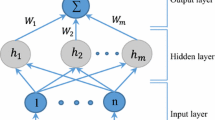Abstract
In this paper, an adaptive control method based on radial basis function(RBF) neural network is proposed for the force control of 3R manipulator in the workspace. The control goal is to make the manipulator track the impedance trajectory to realize the flexible contact between the manipulator and the environment. Firstly, the Lagrangian-Euler method is used to model the dynamic of 3R manipulator. According to the characteristics of the dynamical model of 3R manipulator, a RBF neural network is adopted to design the adaptive controller, and the stability of the controller is analyzed by using Lyapunov criterion. Through the Simulink module in MATLAB, the effectiveness of the proposed algorithm is verified.
Access this chapter
Tax calculation will be finalised at checkout
Purchases are for personal use only
Similar content being viewed by others
References
Zhang, F.: The application of industrial robot in intelligent manufacturing. Int. J. Comput. Eng. 4(4), 70–84 (2019)
Lin, S.T., Tsai, H.C.: Impedance control with on-line neural network compensator for dual-arm robots. J. Intell. Robot. Syst. 18(1), 87–104 (1997). https://doi.org/10.1023/A:1007992700881
Richard, C.D., Robert, H.B.: Modern Control Systems. Twelfth Publishing House of Electronics Industry, Beijing (2015)
Bruno, S.: Robotics: Modelling, Planning and Control. Xi’an Jiaotong University Press, Xi’an (2020)
Su, W.: Research on Trajectory Tracking Adaptive Control Algorithm for Industrial Manipulators. Southeast University, Nanjing (2018)
Shao, S., Zhang, K.: RISE-adaptive neural control for robotic manipulators with unknown disturbances. IEEE Access 8, 97729–97736 (2020). https://doi.org/10.1109/ACCESS.2020.2997383
Xing, B., Zhang, W.: Robust adaptive control for robotic manipulators based on RBFNN. In: Applied Mechanics and Materials, vol. 397, pp. 1477–1481. Trans Tech Publications Ltd (2013)
Li, J., Zhang, W., Zhu, Q.: Weighted multiple-model neural network adaptive control for robotic manipulators with jumping parameters. Complexity (2020)
Wang, D.: Research on Key Technologies of Force / Position Control of Robotic Manipulators Based on Impedance Control. Shandong University, Jinan (2018)
Lopes, A.M., Almeida, F.: Acceleration based forceimpedance control. In: Proceedings of the 25th IASTED International Conference on Modelling, Identification, and Control, pp. 73–103. Lanzarote (2006)
Zhe, L., Li, S., Zhang, X., et al.: Trajectory optimization of six-degree-of-freedom manipulator based on RBF neural network. Modular Mach. Tool Autom. Manuf. Tech. 1(06), 17–20 (2021). https://doi.org/10.13462/j.cnki.mmtamt.2021.06.004
Xiong, Y.: Fundamentals of Robot Techniques. Huazhong University of Science and Technology Press, Wuhan (1996)
Ge, S.S., Lee, T.H., Harris, C.J.: Adaptive neural network control of robotic manipulators. World Sci. Ser. Robot. Intell. Syst. 19, 396 (1998). https://doi.org/10.1142/3774
Li, Z.: Research and Application of Robot Force /Position Control Methods for Robot-Environment Interaction. Huazhong University of Science and Technology, Wuhan (2011)
Liu, J.: Design of Robot Control System and MATLAB Simulation. Tsinghua University Press, Beijing (2008)
Hogan, N.: Impedance control: an approach to manipulation. In: 1984 American Control Conference, pp. 304–313. IEEE (1984)
Acknowledgements
This work was supported by Tianjin Natural Science Foundation of China (20JCYBJC01060), the National Natural Science Foundation of China (62103203, 61973175), and the Fundamental Research Funds for the Central Universities, Nankai University(63211120).
Author information
Authors and Affiliations
Corresponding author
Editor information
Editors and Affiliations
Rights and permissions
Copyright information
© 2022 The Author(s), under exclusive license to Springer Nature Singapore Pte Ltd.
About this paper
Cite this paper
Wang, D., Li, M., Wang, F., Liu, Z., Chen, Z. (2022). Adaptive Control of 3R Manipulator in the Workspace Based on Radial Basis Function Neural Network. In: Jia, Y., Zhang, W., Fu, Y., Zhao, S. (eds) Proceedings of 2022 Chinese Intelligent Systems Conference. CISC 2022. Lecture Notes in Electrical Engineering, vol 950. Springer, Singapore. https://doi.org/10.1007/978-981-19-6203-5_43
Download citation
DOI: https://doi.org/10.1007/978-981-19-6203-5_43
Published:
Publisher Name: Springer, Singapore
Print ISBN: 978-981-19-6202-8
Online ISBN: 978-981-19-6203-5
eBook Packages: Computer ScienceComputer Science (R0)




